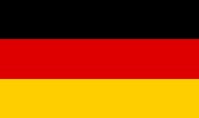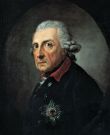Translation by Christoph Werner (Weimar, Thuringia) and Michael Leonard (Petaluma, California)
The designation of Frederick II of Prussia as “great“ necessarily poses the question: By what measure is a ruler called a great prince, a great king or a great emperor? Going back in history we come across names like Alexander the Great (356-323), Charles the Great, whom the French call Charlemagne (747/48-814), Alfred the Great (849-899), Otto the Great (912-973), Peter the Great (1672-1725), Catherine the Great (1729-1796), Frederick William, the Great Elector (1620-1688). We stop and ask ourselves, what about Elizabeth I of England (the Virgin Queen, Good Queen Bess, 1533-1603) and Charles XII of Sweden (1682-1718), why are they not counted among the great?
The Swiss historian Jacob Burckhardt (1818-1897) in an attempt to answer this question wrote about the greatness of historical persons:
„Great men who continue to live as ideals are of high value for the world and particularly for their nations; they invest them with a pathos, a form of enthusiasm, and down to the lower layers of society inspire them intellectually by the vague feeling of greatness: they uphold high standards, they help to recover from temporary humiliation.“
According to this definition it does not seem to matter that almost all of the “great people“ listed above were, even according to the standards of their own time, guilty of outrages as a result of their quest for power and greatness, their sense of being godlike, (or at least having derived their office directly from God), which put them beyond the reach of any worldly authority.
There were some, however, who felt an enormous responsibility for the destiny of their country and the moral well-being of the people under their rule, and dedicated themselves tirelessly to those ends.
But given such different personalities and considering the completely different historical circumstances under which they lived, it must be admitted that there are hardly objective criteria for greatness. Greatness remains – as the historian Kunisch writes, “a fictional category, which at best allows a mere approach to an historical individual.“
This point of view shall serve to do justice to Frederick II of Prussia.
His talents in music, literature, philosophy and history or in military matters, in all of which he towered far above all his princely or royal contemporaries, are not under discussion here. The outstanding status which he held among the rulers of the 18th century is founded on something different. Like nobody else he intensively and fundamentally took issue with his profession, that of the enlightened and absolute monarch. He applied the standards of his age, the age of enlightenment, in which logical reasoning began to find its place beside or even above religiousness (in its widest sense) to an analysis of his own rule – which is an intellectual achievement even today not many are capable of. Of course in doing so he cannot escape a comparison of how that achievement is contradicted by his power-oriented behaviour as statesman and military commander. However, he could not have otherwise pursued a successful policy in favour of his kingdom.
Already in 1742 Voltaire called him "Frédéric le Grand", a designation he always refused to accept. In his lifetime this title was never officially applied to him.
Frederick's way of ruling – and this is part of his greatness – demanded a measure of self-denial, hard work and self-sacrifice, which to his baroque contemporaries and later generations was viewed with incredulous amazement. At the end of his life personal fame meant nothing to him. The welfare of the state entrusted to him ”by the mere accident of my birth“, as he expressed it, was everything. This led to a romanticising of his person which stands alone in recent German history. He became, still in his own lifetime, extremely popular and even legendary as ”Old Fritz“ (der Alte Fritz) (which Thomas Mann in his essay „Friedrich und die Große Koalition“ commented on thus: „A nightmarish name, if one has a feeling for nightmarishness; because it is to the highest degree nightmarish, when the demon becomes popular and gets a homely name“). The disregard for his own comfort, which at times became grotesque, his contempt of all courtly norms of the time, a personal distance to his environment that was by his contemporaries felt as repulsive coldness – all contributed to his aura of greatness. This was also based on an enlightened concept of rule, which unlike Louis XIV's “l'état, c'est moi (I am the state) declares the king as ”the first servant of the state“.
*****
Recommended reading:
Carlyle, Thomas.1858-65. History of Friedrich II. of Prussia. Called Frederick the Great. Online Version: http://www.gutenberg.org/files/25808/25808-h/files/2101/2101-h/2101-h.htm#2H_4_0002
Fernau, Joachim. 2008. (1972). „Deutschland Deutschland über alles ..." Von Anfang bis Ende. Mit 28 Zeichnungen von Günter Stephan. Berlin: Ullstein Taschenbuch
Frank, Bruno. 1952. (1926). Trenck. Roman eines Günstlings. Frankfurt am Main: S. Fischer Verlag
Haffner, Sebastian. 1981.(1979). Preußen ohne Legende. Bildteil von Ulrich Weyland, Fotos von Peter Thomann. München: Wilhelm Goldmann Verlag
Klepper, Jochen. 1993. (1937). Der Vater. Roman eines Königs. München: Deutscher Taschenbuch Verlag
Kunisch, Johannes. 2004. Friedrich der Große. München: Verlag C. H. Beck
Macauly, Thomas Babington. 1842. Frederick the Great. London.
Mann, Thomas. Friedrich und die Große Koalition. 1965. (1914). In: Altes und Neues. Kleine Prosa aus fünf Jahrzehnten. Berlin und Weimar: Aufbau-Verlag
Mittenzwei, Ingrid. 1980. Friedrich II. von Preußen. Eine Biographie. Berlin: VEB Deutscher Verlag der Wissenschaften
---
Picture: Christian Daniel Rauch: Reiterstandbild Friedrichs des Großen (Unter den Linden, Berlin), Foto von Manfred Brückels, 2005. gemeinfrei, wikipedia






